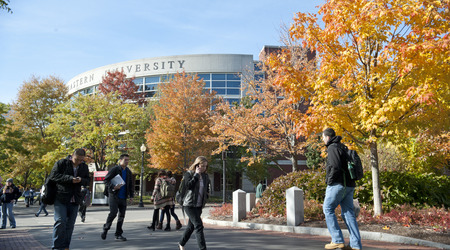Вступительные требования
Secondary school transcripts with final junior year grades. he minimum passing requirements are as follows: TOEFL 92 (reading sub score 22, listening sub score 22, speaking sub score 24, writing sub score 22; IELTS 6.5 (no band below 6.0); PTE 62 (no band below 62); CAE 58. For students applying from secondary schools located outside of the U.S., the SAT and ACT are not required. However, for applicants interested in presenting the most competitive application, Northeastern University strongly encourages applicants to submit one of the following: AP exam results, a full IB diploma, three higher level IB exam scores, or the results from nationally or regionally accredited exams that signify completion of secondary education, are required for entry into universities in their home country and are administered by an independent organization other than the school. In Russia it will be a Unified State Exam.
| Форма обучен. |
Начало |
Продолж. |
Стоимость иностран. |
Период оплаты |
Академ. год |
| Форма обучен.Дневное |
Начало авг |
Продолж.Кол-во лет: 4 |
Стоимость иностран.$48355 |
Период оплатыAcademic year |
Академ. год2017 |
Northeastern University's Biongineering Program provides a broad-based, interdisciplinary engineering curriculum that offers a rigorous yet flexible education. The goal of the curriculum for the Bachelor of Science in Bioengineering is to provide students with a broad understanding of the quantitative analysis of biological systems and a deep expertise in an area of engineering of their choice.
Students begin their education by acquiring a common base of knowledge in engineering that includes fundamental science and mathematics; instrumentation, measurement and imaging skills; quantitative physiology; and biomechanics. In the more advanced courses, students learn to design and analyze biomolecular systems from the viewpoint of multiple disciplines, to understand the dynamical behavior of natural and synthetic bioelectrical networks, and the processing and separation of biological materials. After completing the Bioengineering Core, students choose one of four bioengineering concentrations to focus on: Bioimaging and Signal Processing, Cell and Tissue Engineering, Biomechanics, or Biomedical Devices. Five general electives are available to complement their engineering knowledge with valuable courses in the arts, languages, social sciences, public health, business, broader engineering and computer science disciplines, and related fields.






















